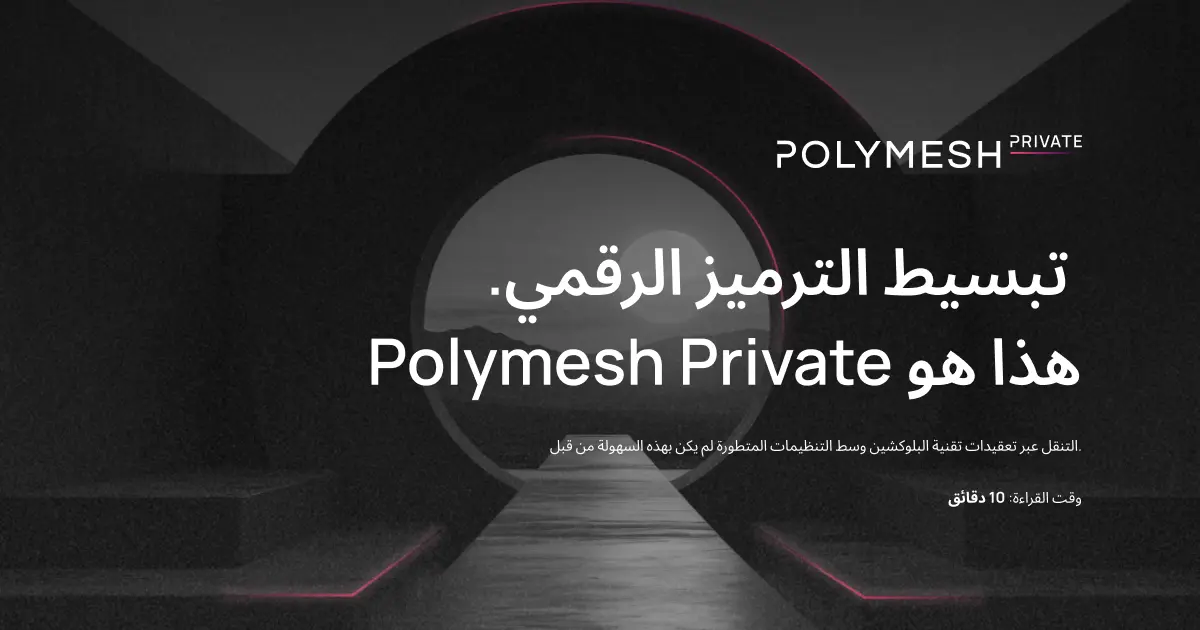Blockchain has a privacy problem. Meet the Cryptography and Blockchain Architect helping us overcome it.
The Polymesh Association is pleased to introduce our Cryptography and Blockchain Architect, Amirreza Sarencheh, a final-year PhD candidate at the University of Edinburgh whose research focuses on developing solutions to address blockchain challenges.
Amirreza's expertise in blockchain is supported by years of experience in academia and industry. In 2022, while pursuing his PhD in computer science, he was honored with the prestigious "Best Fintech Student of the Year" award at the Scottish Financial Technology Awards for his contributions to the financial technology field. He has served as the main contributor in collaboration with other academics at multiple first-of-their-kind projects, notably PEReDi, a Central Bank Digital Currency (CBDC) system; SyRA, a decentralized identity primitive; and PARScoin, a stablecoin system.
As a contributor to the Polymesh Association, Amirreza had a critical role in architecting the privacy functionality of Polymesh Private through the Confidential Assets feature. We’re excited to continue working with him to deliver privacy and confidentiality to the public network and hope you enjoy reading about him and his research below!
What’s your role with the Polymesh Association?
Amirreza: I’m on the team as a Cryptography and Blockchain Architect, conducting research and developing innovative, secure, and efficient solutions for tokenized real-world assets to support Polymesh in achieving its objectives.
Specifically, I am focusing on enhancing privacy within Polymesh through the integration of privacy-preservation mechanisms compatible with a robust regulatory framework. This is achieved via efficient cryptographic constructions based on well-known security assumptions and providing different levels of privacy. This ensures that balances are confidential and when a transaction is observed on the blockchain, third parties cannot determine the amount or type of digital asset being transferred, nor can they identify the sender or receiver. All of this is done in compliance with strict regulations.
What’s your history with blockchain?
Amirreza: My interest in blockchain and decentralization was sparked in 2014, leading me to begin my master's studies in cryptography—which underlies blockchains—in 2015. In other words, I started my journey into the world of blockchain with a deep-rooted interest in cryptography, which combines theoretical aspects of mathematics with practical implementations within computer science.
Cryptography's wide range of applications, from e-commerce to securing our digital presence, particularly attracts me as we advance toward an increasingly digital world. It plays a crucial role in ensuring the privacy, security, and integrity of our digital presence.
I later progressed to my PhD at the University of Edinburgh's Blockchain Technology Laboratory, where I focused on developing new solutions to address challenges in blockchain technology. My PhD research has been supported by Input Output Global (IOG), formerly known as IOHK, a blockchain research and engineering company. This collaboration has allowed me to consult with IOG and work with its chief scientist, who is also my main PhD supervisor, aligning my academic research with real-world blockchain needs.
My work has involved both theoretical and practical aspects, and I have been fortunate to share my insights on blockchain through talks and workshops. I have had the privilege of engaging with institutions and organizations such as the Bank of England, JP Morgan, Microsoft Research, and the London Stock Exchange Group. These engagements have allowed me to contribute to the broader discourse on blockchain technology and its potential to transform various sectors.
What is your PhD research about and how does it impact Polymesh?
Amirreza: My PhD research focuses on addressing critical challenges within the blockchain sector, specifically targeting issues related to security, privacy, and efficiency. I concentrate on areas such as Payments, Decentralized Identities (DIDs), Stablecoins, DeFi applications, and Central Bank Digital Currencies (CBDCs).
One of my PhD projects was designing a novel Central Bank Digital Currency (CBDC) system called PEReDi. PEReDi offers full privacy for users, concealing transaction values and the identities of senders and receivers, while ensuring regulatory compliance by requiring proof of compliance before transaction finalization.
In another project, a new cryptographic primitive was developed: a digital signature that provides privacy for the signer and is Sybil-resistant, called SyRA signatures. SyRA signatures have various applications in multiparty systems, such as e-voting (e.g., for decentralized governance), privacy-preserving regulatory compliance (e.g., AML/CFT checks), and cryptocurrency airdrops, making them an attractive option for deployment in Decentralized Identity (DID) systems.
Another project of mine addresses the limitations of typical stablecoin implementations via smart contracts, such as questionable levels of privacy, potentially high fees, and lack of scalability. To overcome these challenges, a new design called PARScoin was proposed.
My research aligns closely with Polymesh's goals of enhancing privacy, facilitating regulatory compliance, and improving efficiency for institutions tokenizing real world assets. Privacy is important when dealing with sensitive financial data and transactions involving regulated assets. On the regulatory side, Polymesh has a robust framework that can operate within a privacy-preserving setting. Additionally, Polymesh supports quick and deterministic transaction settlement, enhancing the overall user experience and operational effectiveness. These aspects are highly related to my PhD research’s aim to foster broader adoption and practical use of blockchain platforms.
What’s one problem you’re excited to help Polymesh overcome?
Amirreza: Privacy is critical as it protects users from having their transaction history publicly visible. Imagine the entire world seeing all your interactions with the blockchain ecosystem, from receiving your salary to borrowing a loan. This becomes even more significant in the context of tokenized real world assets.
In traditional finance, users benefit from strong privacy protections, a feature often lacking in many blockchains. Polymesh addresses this by combining the transparency of blockchain technology with enhanced privacy measures. The platform is committed to further strengthening its privacy-preserving capabilities to deliver an experience that parallels the confidentiality offered by off-chain applications.
Without regulatory compliance, such as Know Your Customer (KYC), and Anti-Money Laundering (AML), blockchain adoption would be limited. These regulations require transparency to verify the legitimacy of transactions and the identities of participants—e.g., ensuring that funds are not used for illicit activities. For instance, knowing the identity of the sender helps verify the source of funds (AML), and knowing the identity of the receiver ensures they are not on a sanction list.
Balancing privacy and transparency is complex because these two requirements inherently conflict. Enhancing privacy obscures information needed for regulatory compliance, presenting a significant challenge. Many blockchain systems struggle to achieve both, and those that do often face inefficiencies, such as long transaction times, rendering them unsuitable for real-world use cases.
Cryptography plays a crucial role in overcoming this challenge by enabling privacy while allowing for necessary regulatory insights. Techniques like zero-knowledge proofs enable users to prove regulatory compliance without disclosing sensitive information. For example, a receiver can prove they are not on a sanction/terrorist list without revealing their identity. Similarly, users can prove certain attributes of their (hidden) identity in a privacy-preserving manner to comply with KYC regulations. However, designing efficient constructions in a decentralized setting with standard assumptions is challenging.
What excites me about working with Polymesh is its goal to offer full privacy to users—concealing all sensitive transaction information such as the identities of the sender and receiver, the value being transferred, and the asset type—while maintaining a compliance-capable framework that is decentralized, trustless, and efficient. It’s a fascinating opportunity to contribute to the advancement of privacy-preserving and compliant blockchain technology.
What book, podcast, or online material about the industry had the most impact on you?
Amirreza: In addition to cryptography papers that address various blockchain challenges, I recommend the following resources for easily and efficiently educating oneself about different topics in the industry.
Blockchain and Web3 MOOCs
MOOCs (Massive Open Online Courses) offer a wide range of educational videos on blockchain technology and Web3 with comprehensive coverage and high-quality content. MOOCs cover fundamental concepts as well as advanced topics, making them suitable for both beginners and experienced professionals.
a16z Crypto
The a16z Crypto is another excellent resource with insightful analysis and forward-thinking perspectives. Run by Andreessen Horowitz, a leading venture capital firm, this channel features in-depth discussions, interviews, and panel sessions with industry experts. The content spans a wide range of topics, including blockchain infrastructure, Decentralized Finance (DeFi), and the future of Web3.
IC3: Initiative for Cryptocurrencies & Contracts
IC3 is one of the leading academic initiatives focused on advancing the science and applications of cryptocurrencies and smart contracts. The IC3 YouTube channel offers a wealth of lectures, seminars, and presentations from renowned researchers in the field. The cutting-edge research and academic rigor presented in these videos is fascinating, particularly in areas like cryptographic protocols and decentralized systems.
If you enjoyed this post and want to see more introductions from the team at the Polymesh Association, let us know by tweeting us @PolymeshNetwork or leaving a message in the Polymesh Discord.
Enter Polymesh Private, a bespoke privately-run instance of the Polymesh blockchain that combines the benefits of its purpose-built infrastructure with enhanced privacy and control.









































